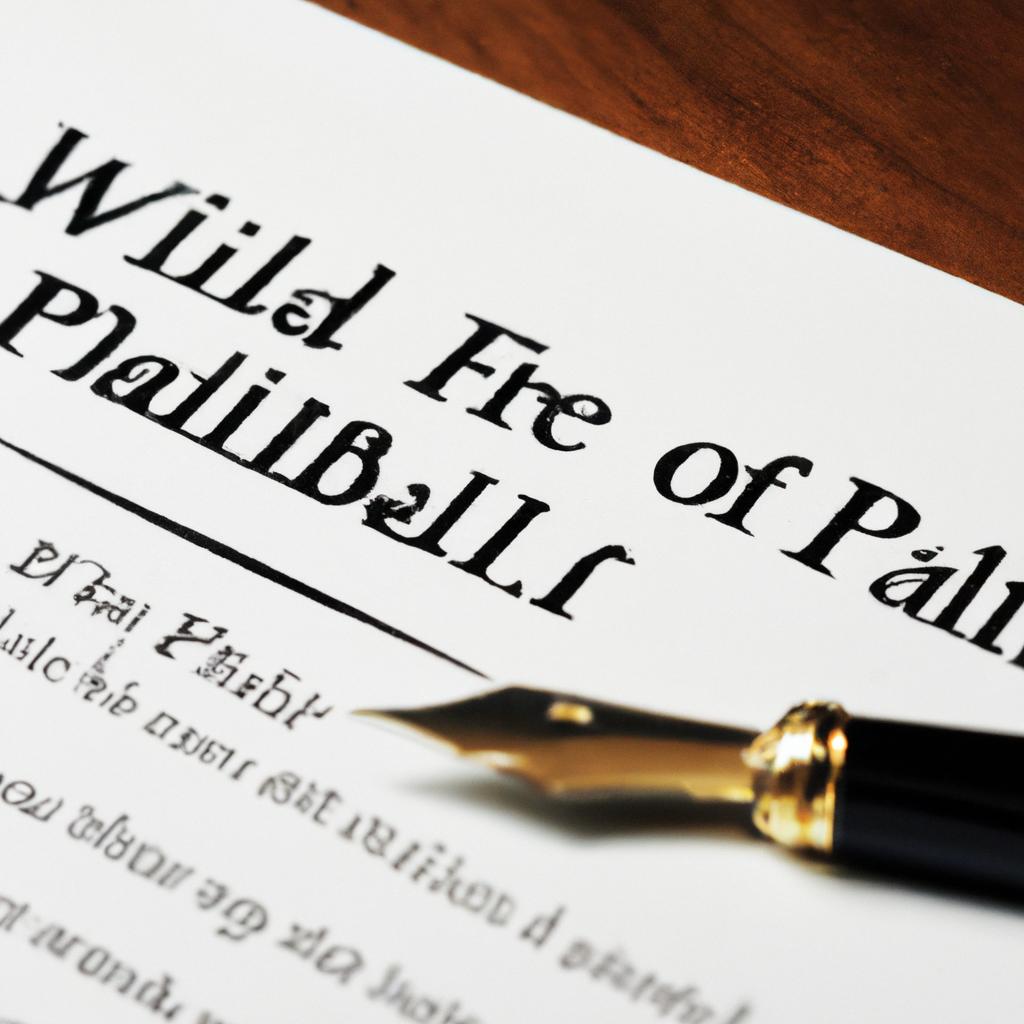In the intricate web of estate planning, the question of whether one can file a will before death is a topic that intrigues many. As experienced practitioners in the field of law, we at Morgan Legal Group understand the complexities that come with crafting a legally binding last testament. In this article, we will delve into the legal framework surrounding the filing of wills prior to one’s passing, examining the feasibility and implications of such actions within the realm of estate planning. Join us on this journey as we explore the possibilities and limitations of filing a will before death.
– Preparing a Will: Understanding the Legal Requirements
When it comes to preparing a will, many individuals wonder whether it is possible to file a will before death. The answer is yes, you can indeed create a will before passing away. It is essential to meet all legal requirements to ensure that your will is valid and legally binding. By understanding the legal requirements for creating a will, you can ensure that your final wishes are carried out as you intended.
Some key legal requirements for preparing a will include:
- Age requirement: You must be of legal age (usually 18 or older) to create a will.
- Capacity: You must be of sound mind and understand the implications of creating a will.
- Signature: Your will must be signed by you in the presence of witnesses.

- Filing a Will Before Death: Exploring the Probate Process
When it comes to the probate process, many people wonder if they can file a will before death. The answer is yes, it is possible to file a will before death. By doing so, you can ensure that your wishes are legally documented and properly executed upon your passing.
One of the main benefits of filing a will before death is that it helps to streamline the probate process for your loved ones. By having a clear and legally binding document in place, you can help to avoid any potential conflicts or disputes among family members. Additionally, filing a will before death can provide you with peace of mind knowing that your assets and property will be distributed according to your wishes.

– The Benefits of Pre-Filing a Will: Ensuring Your Wishes are Honored
When it comes to estate planning, one important question that often arises is whether you can file a will before death. The answer is yes, you can pre-file a will to ensure that your wishes are legally documented and honored after your passing. By taking this proactive step, you can provide clarity and peace of mind for your loved ones, as well as avoid potential disputes or challenges to your estate.
Pre-filing a will offers several benefits, including:
- Legal Protection: By having a will in place before your death, you can protect your assets and ensure they are distributed according to your wishes.
- Peace of Mind: Knowing that your affairs are in order can provide peace of mind for you and your family.
- Avoiding Delays: Pre-filing a will can help expedite the probate process and avoid unnecessary delays in distributing your assets.

– Consult with an Experienced Estate Planning Attorney for Guidance
Estate planning is a crucial aspect of preparing for the future, and consulting with an experienced attorney can provide you with the guidance you need to make informed decisions. At Morgan Legal Group, our team of knowledgeable professionals can help you navigate the complex world of estate planning to ensure that your wishes are carried out effectively.
One common question that individuals have is whether they can file a will before death. The answer is yes, you can indeed create a will during your lifetime to outline how you want your assets to be distributed after your passing. By working with a skilled estate planning attorney, you can create a legally binding document that reflects your wishes and provides clarity for your loved ones. Contact Morgan Legal Group today to schedule a consultation and begin the process of securing your legacy.
Q&A
Q: Can you file a will before death?
A: Yes, you can file a will before death to ensure your wishes are carried out after you pass away.
Closing Remarks
In conclusion, the question of whether you can file a will before death is a complex one that varies depending on your jurisdiction and circumstances. While some may choose to create a will before death for peace of mind, others may prefer to wait until the end of life to ensure their final wishes are accurately reflected. Ultimately, it is important to consult with a qualified legal professional to determine the best course of action for your individual situation. Remember, planning ahead can bring a sense of security and comfort, knowing that your wishes will be carried out as desired. So, whether you choose to file a will before death or not, the most important thing is to ensure your legacy is protected.
 Can You File a Will Before Death: Exploring the Important Considerations, Benefits, and Process
Can You File a Will Before Death: Exploring the Important Considerations, Benefits, and Process
When it comes to estate planning, creating a will is a crucial step in ensuring your final wishes are carried out and your loved ones are taken care of after you pass away. But what if you want to make your will official before your death? Can you file a will before death? The short answer is yes. However, there are important considerations, benefits, and processes to understand before doing so. In this article, we will delve into the topic and explore everything you need to know about filing a will before death.
Understanding the Basics: What is a Will?
Before we dive into the specifics of filing a will before death, let’s start with the basics. A will is a legal document that outlines your final wishes regarding asset distribution, care for minor children, and funeral arrangements after your death. It is a crucial document that ensures your loved ones are taken care of and your wishes are respected after you pass away.
Can You File a Will Before Death?
Yes, you can file a will before death. It is also known as a “living will” or “pre-death will.” This means that you create and sign the will while you are still alive, and it is legally binding. However, the will only becomes effective after your death, just like a traditional will. This option is available in most states and can offer some benefits for you and your loved ones.
Important Considerations When Filing a Will Before Death
Before making the decision to file your will before death, it’s essential to consider the following points:
1. State Laws and Requirements
Each state has its own laws and requirements for filing a will, including before death. It’s crucial to understand your state’s specific rules to ensure your will is valid and binding. Most states require witnesses and a notary public to sign the will for it to be considered legally binding.
2. Possible Changes to Your Will
Filing a will before death means that the will is fixed and final. This means that any changes or updates you want to make to your will must be done officially through an amendment or by creating a new will. Keep this in mind if your preferences or circumstances change in the future.
3. Family Dynamics
Filing a will before death can potentially cause family conflicts and disputes if some family members feel left out or disagree with the terms of the will. It’s essential to have open and honest conversations with your loved ones before filing your will to ensure everyone is on the same page and to avoid any possible misunderstandings and disputes.
4. Possibility of Becoming Incapacitated
One of the main reasons people want to file a will before death is to ensure that their wishes are carried out even if they become incapacitated before their death. However, it’s important to include provisions in your will for this possibility, such as naming a trusted individual to make decisions on your behalf in case you become incapacitated.
Benefits of Filing a Will Before Death
Now that we’ve explored the considerations, let’s take a look at the benefits of filing a will before death:
1. Peace of Mind
Filing a will before death can provide you with peace of mind knowing that your final wishes are legally documented and will be carried out after your death.
2. Avoid Unnecessary Expenses
A will that’s filed before death can help to avoid unnecessary expenses associated with probate court and legal fees after your death. This can ultimately save money for your loved ones and ensure that they receive their inheritances according to your wishes.
3. Expedite the Probate Process
By filing a will before death, you can expedite the probate process, which can typically be lengthy and drawn out, causing stress and burden on your loved ones. Filing a will before death can help streamline the process and ensure your loved ones receive their inheritances in a timely manner.
How to File a Will Before Death
The process of filing a will before death is similar to creating a traditional will, but there are some additional considerations. Here are the steps to follow:
1. Draft Your Will
The first step is to draft your will. You can either write it yourself or seek assistance from a lawyer or a professional estate planner. Be sure to include all necessary details, such as your assets, beneficiaries, and executor of the will.
2. Get it Notarized
After drafting your will, you must get it notarized by a notary public to make it legally binding. Some states also require additional witnesses to sign the will as well.
3. Store Your Will Properly
It’s crucial to store your will in a safe and accessible place, such as a safety deposit box or with your lawyer. Make sure your loved ones know where to find it in case of your death.
4. Keep it Updated
Remember to keep your will updated if any significant changes or life events occur. This will help to ensure that your final wishes are accurately reflected in the will and avoid any disputes or confusion after your death.
In Conclusion
Filing a will before death is a viable option for ensuring your wishes are legally documented and carried out after your death. However, it’s important to consider all factors, benefits, and potential drawbacks before making a decision. It’s also crucial to understand your state’s laws and requirements for filing a will before death to ensure it’s valid and enforceable. By carefully considering your options and taking the necessary steps to draft and file your will, you can have peace of mind knowing that your loved ones will be taken care of according to your final wishes after your death.

